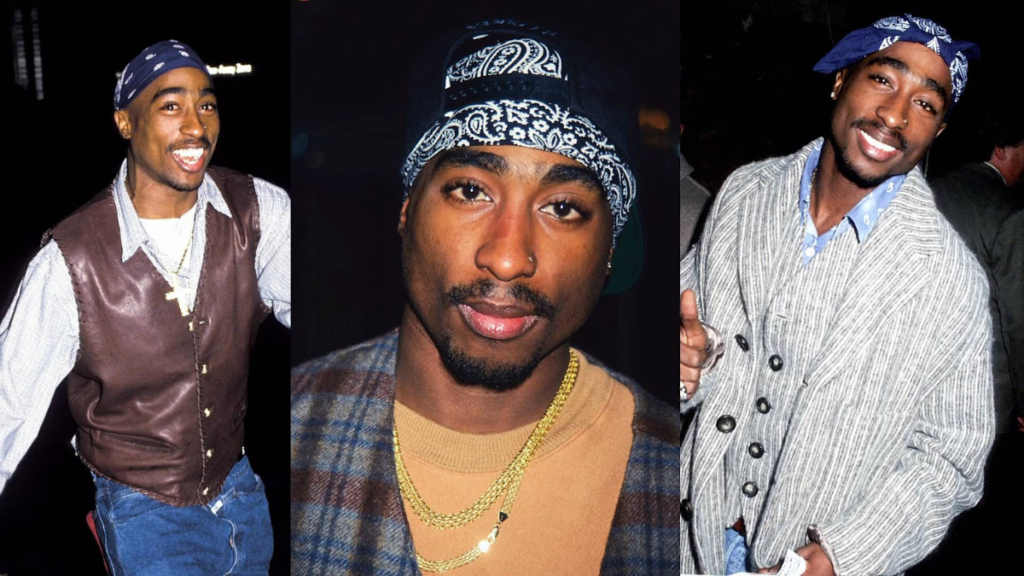Tupac Shakur, born on June 16, 1971, in East Harlem, New York City, was a prolific rapper, actor, and social activist who left an indelible mark on the music industry and cultural landscape. Raised by activist parents during the Black Panther movement, he was exposed to social and political consciousness from an early age, which laid the foundation for his later commitment to addressing issues of racial inequality, police brutality, and poverty in his music.
Tupac’s rap career gained momentum in the late 1980s and by the early 1990s, he had become a central figure in the West Coast hip-hop scene. His fourth studio album, “All Eyez on Me,” remains one of the best-selling rap albums of all time. His artistic prowess was not just his magnetic stage presence but also his ability to weave intricate narratives through his lyrics.
Tupac’s life was marked by controversies and legal battles, but he remained steadfast in his commitment to using his platform for change. His posthumous releases, such as “The Don Killuminati: The 7 Day Theory,” continued to dominate the charts and showcase his prolific output. His legacy lives on in the hearts and minds of fans worldwide, as he was more than just a rapper; he was a revolutionary voice that transcended the boundaries of music.
Early Life and Influences:
Tupac’s journey began against a backdrop of adversity. Raised by activist parents, Afeni Shakur and Billy Garland, in the midst of the Black Panther movement, he was exposed to social and political consciousness from an early age. These formative years laid the foundation for Tupac’s later commitment to addressing issues of racial inequality, police brutality, and poverty in his music.
Rise to Stardom:
Tupac’s rap career gained momentum in the late 1980s, and by the early 1990s, he had become a central figure in the burgeoning West Coast hip-hop scene. Signing with Death Row Records, he released his fourth studio album, “All Eyez on Me,” in 1996, a double-disc masterpiece that showcased his lyrical prowess and versatility. This album remains one of the best-selling rap albums of all time, a testament to Tupac’s impact on the genre.
Artistic Prowess:
What set Tupac apart was not just his magnetic stage presence but also his ability to weave intricate narratives through his lyrics. His verses were a blend of raw emotion, vivid storytelling, and a keen social consciousness. Tracks like “Changes” and “Brenda’s Got a Baby” are poignant examples of Tupac’s skill in using his platform to shed light on the struggles of marginalized communities.
Activism and Social Commentary:
Beyond his musical prowess, Tupac Shakur was an unapologetic advocate for social justice. He fearlessly used his influence to address systemic issues plaguing the African American community. Whether it was calling out police brutality in “Trapped” or questioning the impact of the justice system in “Only God Can Judge Me,” Tupac’s music was a platform for social commentary.
Controversies and Legal Troubles:
Tupac’s life was marked by controversies and legal battles. From altercations with law enforcement to feuds with fellow artists, his career was often overshadowed by personal struggles. The notorious East Coast-West Coast rivalry, which pitted him against artists like The Notorious B.I.G., added a layer of complexity to his public persona. However, amidst the chaos, Tupac remained steadfast in his commitment to using his platform for change.
Acting Career:
In addition to his musical achievements, Tupac Shakur pursued an acting career that showcased his versatility. His performances in films like “Juice” and “Poetic Justice” demonstrated his ability to captivate audiences on the big screen. Tupac’s foray into acting hinted at the potential for a multifaceted career that was tragically cut short.
Legacy and Posthumous Releases:
Tupac Shakur influence extends far beyond his lifetime. His posthumous releases, including albums like “The Don Killuminati: The 7 Day Theory,” continued to dominate the charts. The unreleased material showcased his prolific output and left fans yearning for more. The holographic projection of Tupac at the 2012 Coachella Valley Music and Arts Festival further emphasized the enduring nature of his legacy.
Impact on Hip-Hop Culture:
Tupac Shakur’s impact on hip-hop culture is immeasurable. He challenged the status quo, blending activism with artistry and providing a voice for those often unheard. His influence can be seen in the work of countless contemporary artists who continue to draw inspiration from his unapologetic approach to storytelling and social commentary.
Conclusion:
Tupac Shakur’s life may have been tragically cut short, but his legacy lives on in the hearts and minds of fans worldwide. He was more than just a rapper; he was a revolutionary voice that transcended the boundaries of music. Tupac’s enduring impact on hip-hop culture and his unwavering commitment to social justice ensure that his influence will continue to resonate for generations to come. In the words of Tupac himself, “I’m not saying I’m gonna change the world, but I guarantee that I will spark the brain that will change the world.”







